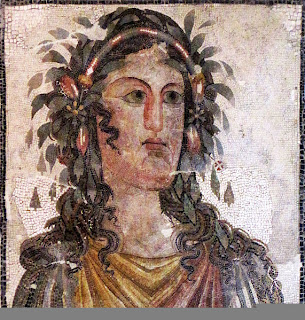An idea. An idea not related to bubbles or bathtubs or dinner or Do Wah.
 |
| Roman mosaic of a Muse |
Or how to redecorate your office with a steam punk theme.
Or, if you're a writer, how to end the story you've been working on for three years this April. It’s so obvious now. The tsar must die, but only after revealing the identity of his true heir. . .Boris, the one-eyed taxidermist from Smolensk.
Where do ideas come from--those moments when the light bulb goes on and the tumblers click? The ancient Greeks attributed inspiration to nine ladies called The Muses.
.jpg) |
| L to R, Clio (history), Thalia (comedy), Erato (love poetry), Euterpe (song), Polyhymnia (sacred music), Calliope (epic poetry), Terpsichore (dance), Urania (astronomy), and Melpomene (tragedy) |
The Muses suggest that the ancient Greeks had these ideas about inspiration:
- Ideas come from outside ourselves, from Heaven.
- There is a feminine quality to inspiration.
- Inspiration is related to memory.
 |
| The Muse of Poesey by Konstantin Makovsky |
Personally, I think the ancients were on to something with the Muses. As a story-maker, I know that stories are built partly from my memory and experience, but not entirely. There is something else. My experience is the kindling, but kindling needs a spark to set it ablaze, and that spark of inspiration is a gift.
Fool that I am, sometimes I try to light the creative fire all by myself. Did you ever rub two sticks together in a pouring rain? That's what it's like.
 |
| Marc Chagall - Offering of Elijah |
When you think about it, the kindling, the spark, and life itself -- all are gifts from God. When God grants to us or to others the privilege of using creativity, our proper response is not pride, but gratitude--not fear, but faith--not envy, but joyful celebration.
 |
| Nine Muses dancing with Apollo |
EPILOGUE: The Muses liked to hang out at the sacred fountain of Hippocrene on Mt. Helicon. Hippocrene was said to be a fount of poetic inspiration. Maybe that's why we always get brilliant ideas in the bathtub!













.png)










